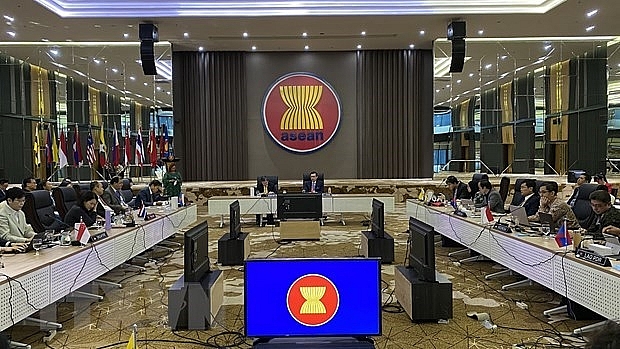Vietnam hosts first meeting of CPR to ASEAN in 2020
 |
| The first meeting of the Committee of Permanent Representatives (CPR) to the Association of Southeast Asian Nations (ASEAN) in 2020 was held in Jakarta, Indonesia, on January 9. (Photo: VNA) |
Vietnamese Ambassador Tran Duc Binh, head of the Vietnamese Permanent Mission to ASEAN, presided over the event, which also saw the attendance of ambassadors and permanent representatives from other ASEAN countries. ASEAN Secretary General Dato Lim Jock Hoi was present at the opening ceremony.
In his opening remarks, Binh highlighted the theme of the ASEAN Year 2020 – “Cohesive and Responsive” and priorities proposed by Vietnam as ASEAN Chair for the year.
Priorities have been set to spur the development of the ASEAN Community, enhance regional connectivity, improve adaptability, take advantage of opportunities from the Fourth Industrial Revolution, raise the ASEAN identity, capacity and operational efficiency, promote the group’s central role, and step up its relations and cooperation with partners in order to consolidate a peaceful environment and a secure, stable region.
The Vietnamese mission that holds the CPR Presidency will work together with member countries and the ASEAN Secretariat to continue implementing the 2019-2020 work programme, focusing on strengthening coordination in addressing cross-pillar and inter-sectoral issues regarding building the ASEAN Community, improving the capacity and operational efficiency of the ASEAN Secretariat, and realising priorities of the Master Plan on ASEAN Connectivity 2025 and the Initiative for ASEAN Integration on narrowing the development gap, the ambassador said.
Binh stressed that the CPR will prioritise the early completion of eight draft action plans between ASEAN and partners like Canada, China, India, the EU, the Republic of Korea, New Zealand, the US and the UN during the 2021-2025 period, which are expected to be adopted at the ASEAN Foreign Ministers’ Meeting in August, along with draft joint declarations of ministers’ meetings and high-level meetings between ASEAN and its partners, including ASEAN 1, ASEAN 3 and the East-Asia Summit (EAS) slated for November.
According to the ambassador, to raise awareness and realise the group’s priorities on environmental protection and plastic waste reduction, and improve the efficiency of CPR meetings, there will be no plastic waste or printed documents at meetings in 2020.
The initiative has received the approval of other ASEAN member countries and the ASEAN Secretariat, he said.
Addressing the opening ceremony, ASEAN Secretary General Dato Lim Jock Hoi lauded the theme of the ASEAN Year 2020 chosen by Vietnam, which he said is timely and suitable because amidst fierce competition, rising protectionism and new security challenges, ASEAN needs to maintain and promote its central role, intensify economic connectivity, and adapt and utilise opportunities generated by the Fourth Industrial Revolution.
To that end, it is necessary for the grouping to improve its identity, deepen ties with partner countries and pay more attention to enhancing institutional capacity, he suggested.
Emphasising the CPR’s central position in ASEAN activities, Lim Jock Hoi said the committee should uphold its significant role in forging cooperation between sectors in ASEAN Community building activities.
Close relations and collaboration between the CPR and the ASEAN Secretariat should be maintained, thus helping to raise connectivity in ASEAN, he said.
Lim Jock Hoi expressed his hope that member countries will increase all-level meetings in Jakarta, and pledged that the ASEAN Secretariat will closely coordinate and cooperate with Vietnam to successfully realise the country’s priorities and initiatives for the bloc in 2020, laying an important foundation for the ASEAN Community to further develop in the years to come.
According to the ASEAN Charter, the CPR was put into operation in early 2009, with its tasks focusing on monitoring the implementation of leaders’ decisions, implementing master plans on the ASEAN Community, helping ministers coordinate cross-pillar and inter-sectoral issues, strengthening relations with ASEAN’s external partners, and providing substantive and administrative direction and support to the ASEAN Secretariat.
What the stars mean:
★ Poor ★ ★ Promising ★★★ Good ★★★★ Very good ★★★★★ Exceptional
 Tag:
Tag:
Related Contents
Latest News
More News
- Spring Fair 2026 boosts domestic demand (March 02, 2026 | 16:30)
- Law on Investment takes effect (March 02, 2026 | 16:21)
- Ho Chi Minh City attracts nearly $980 million in FDI in early 2026 (March 02, 2026 | 10:57)
- Businesses bouncing back after turbulent year (February 27, 2026 | 16:42)
- VinaCapital launches Vietnam's first two strategic-beta ETFs (February 26, 2026 | 09:00)
- PM sets five key tasks to accelerate sci-tech development (February 26, 2026 | 08:00)
- PM outlines new tasks for healthcare sector (February 25, 2026 | 16:00)
- Citi report finds global trade transformed by tariffs and AI (February 25, 2026 | 10:49)
- Vietnam sets ambitious dairy growth targets (February 24, 2026 | 18:00)
- Vietnam, New Zealand seek level-up in ties (February 19, 2026 | 18:06)






















 Mobile Version
Mobile Version